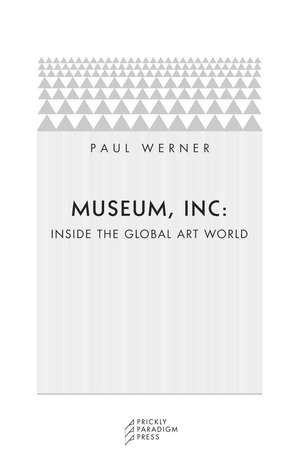Museum, Inc.: Inside the Global Art World
Autor Paul Werneren Limba Engleză Paperback – 2 mar 2006
Has corporate business overtaken the art world? It's no secret that art and business have always mixed, but their relationship today sparks more questions than ever. Museum, Inc. describes the new art conglomerates from an insider's perspective, probing how their roots run deep into corporate culture. Paul Werner draws on his nine years at the Guggenheim Museum to reveal that contemporary art museums have not broken radically with the past, as often claimed. Rather, Werner observes, they are the logical outcome of the evolution of cultural institutions rooted in the eighteenth-century Enlightenment, the colonial expansion of the liberal nation-state, and the rhetoric of democracy.
In a witty and argumentative style, Werner critically analyzes today's art institutions and reframes the public's accepted view of them, exposing how their apparent success belies the troubling forces operating within them. He ultimately argues that the art museum we know and love may have already run its course. An engaging discourse structured as an informal gallery talk, Museum, Inc. is a thought-provoking and passionate polemic that offers ideas for a new, more democratic museum.
In a witty and argumentative style, Werner critically analyzes today's art institutions and reframes the public's accepted view of them, exposing how their apparent success belies the troubling forces operating within them. He ultimately argues that the art museum we know and love may have already run its course. An engaging discourse structured as an informal gallery talk, Museum, Inc. is a thought-provoking and passionate polemic that offers ideas for a new, more democratic museum.
Preț: 59.88 lei
Preț vechi: 76.56 lei
-22% Nou
Puncte Express: 90
Preț estimativ în valută:
11.46€ • 11.92$ • 9.46£
11.46€ • 11.92$ • 9.46£
Carte indisponibilă temporar
Doresc să fiu notificat când acest titlu va fi disponibil:
Se trimite...
Preluare comenzi: 021 569.72.76
Specificații
ISBN-13: 9780976147510
ISBN-10: 0976147513
Pagini: 88
Dimensiuni: 114 x 178 x 5 mm
Greutate: 0.08 kg
Ediția:73
Editura: Prickly Paradigm Press
Colecția Prickly Paradigm Press
ISBN-10: 0976147513
Pagini: 88
Dimensiuni: 114 x 178 x 5 mm
Greutate: 0.08 kg
Ediția:73
Editura: Prickly Paradigm Press
Colecția Prickly Paradigm Press
Notă biografică
Paul Werner is the editor of WOID and the publisher of the Orange Press. He is a lecturer at New York University and the School of Visual Arts in New York City.
Cuprins
ONE: The genius of capitalism–and vice-versa
I.
II.
III.
IV.
V.
TWO: Rituals of authority
I.
II.
III.
IV.
II.
III.
IV.
THREE: If you build it they will come. Then you can beat the crap out of them.
I.
II.
III.
IV.
II.
III.
IV.
FOUR: Rio: The Highest Stage of Bilbao
A Note
Recenzii
"What a treat. And what catharsis. . . . 75 delicious pages of witty remarks and cogent arguments. It's truly enviable to be able to write like this. . . . A must-read for people who feel that something has gone off in the museum business."
"Rich in metaphor."
"Relentlessly brilliant, hilarious, dead-on and hyperwitty. . . . All sorts of searing insights about today's big-time art world, its unholy mixture of funny money, fake egalitarianism, and backroom investment schemes. . . . A canny erudite analysis of the high-art market from the Enlightenment to now."
"At the Guggenheim, Krens's ways of filling the proliferating branches . . . were all hailed at the time for their business savvy and cultural daring. But as former Guggenheim employee Paul Werner chronicles in his punchy little book, Museum Inc: Inside the Global Art World, Krens's bold maneuvers didn't stand the test of even a decade's time. When you learn, for example, that BMW underwrote the motorcycle show, Krens's cultural daring loses some of its luster. When you find out they gave Krens a motorcycle (which he later returned), it doesn't even look like good business."
"Paul Werner uses Thomas Krens's directorship of the Guggenheim Foundation as a case study to argue that museums have taken to acting like 'monster corporations,' globalizing the art industry and treating their collections as capital. Werner's writing style 'is unruly,' say Ida Applebroog. 'He has no restraints, and that's the part I love.'"
"The capitalist involution of art is announced with cheerful rage in Paul Werner’s Museum, Inc: Inside the Global Art World (2005), in which he parses the proposition that art behaves like money because money behaves like art. This is the capital of the America Werner dubs 'the Living Museum of Wild Capitalism'. Or perhaps that’s Out West."
"A rollicking little screed. . . . Werner has a good eye for the smoke- and-mirrors of the marketing people and what it often serves to hide, which is a synergy between art museums and corporate ambition that has little to do with art itself."
